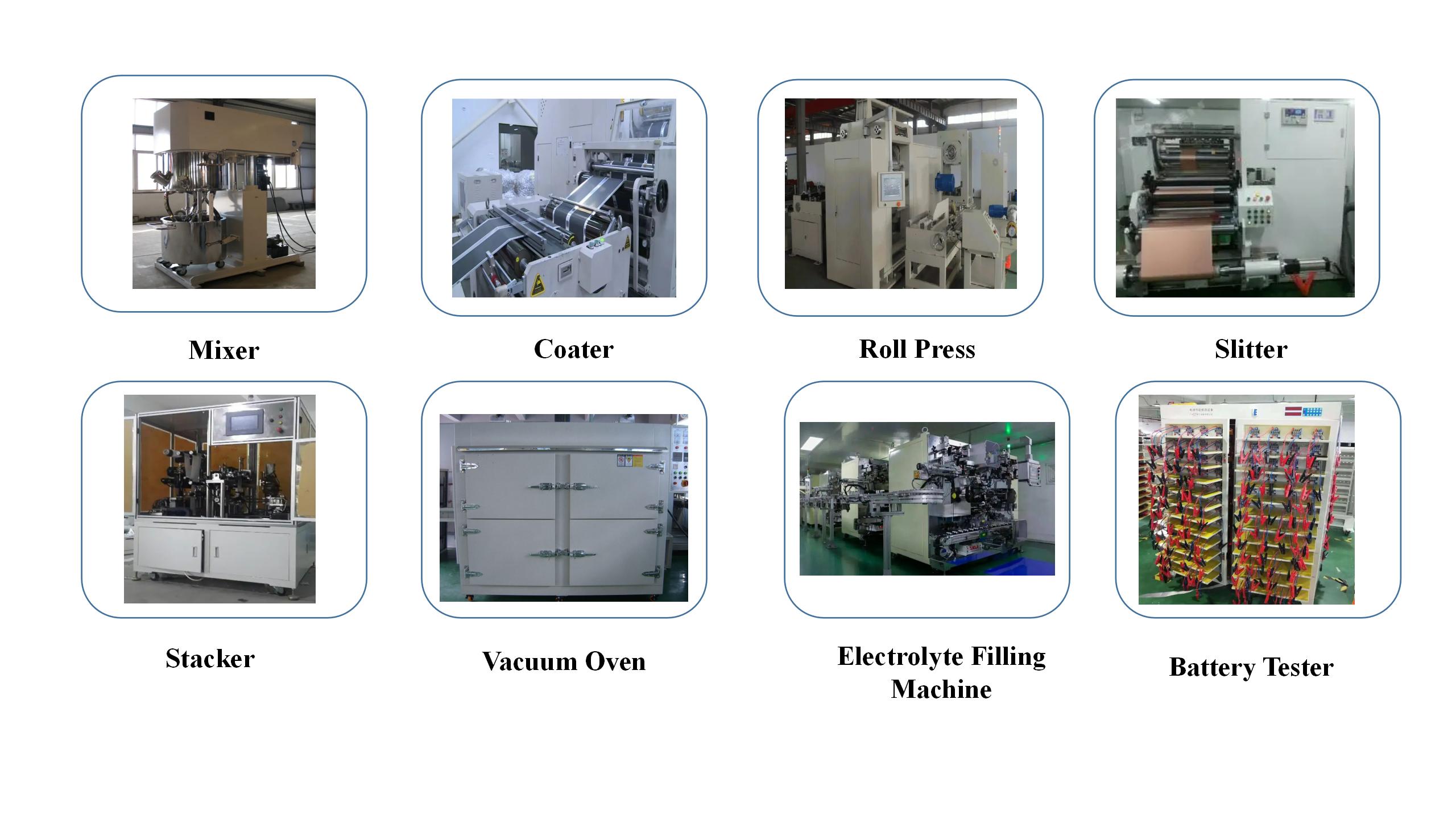- Language:
 English ▼
English ▼
 English ▼
English ▼Car battery manufacturing line are responsible for manufacturing car batteries, which are essential components in electric vehicles (EVs) and hybrid electric vehicles (HEVs). Here are some key aspects of knowledge related to Car battery pilot line
Battery Cell Types:
Understand the specific chemistries used in lithium-ion batteries, such as lithium cobalt oxide (LCO), lithium manganese oxide (LMO), lithium nickel cobalt aluminum oxide (NCA), and lithium iron phosphate (LFP).
Explore the advantages and disadvantages of each chemistry, including energy density, power density, thermal stability, cycle life, cost, and safety considerations.
Electrode Manufacturing Processes:
Dive deeper into electrode preparation and coating techniques, such as slurry mixing, calendaring, and doctor blade coating, to achieve precise and uniform electrode thickness and density.
Learn about the drying and heat treatment processes to ensure the proper solidification and adhesion of active materials on current collectors.
Battery Cell Assembly:
Gain insights into the intricacies of cell assembly, including the stacking of positive and negative electrodes with separators, tab welding or ultrasonic bonding, and the addition of electrolyte.
Explore the use of advanced techniques like laser welding, plasma treatment, or hot pressing for improved cell performance and reliability.
Electrolyte Filling and Cell Sealing:
Understand the importance of accurate electrolyte filling to achieve optimal cell performance and safety. Explore techniques such as vacuum filling, injection filling, or pre-wetted electrode assembly.
Delve into different cell sealing methods, such as crimping, laser welding, or heat sealing, and their impact on cell integrity, gas tightness, and cycle life.
Battery Module and Pack Assembly:Car battery fabrication line
Learn about module and pack design considerations, including mechanical and electrical integration, cooling systems, voltage balancing, and communication interfaces.
Explore assembly processes such as cell interconnection methods (welding, ultrasonic bonding), busbar installation, thermal interface materials (TIM), and insulation systems.
Manufacturing Equipment and Technologies:
Deepen your understanding of specialized equipment used in battery fabrication, such as electrode coating machines with slot die or doctor blade systems, precision stacking machines, automated electrolyte filling stations, and module assembly stations with robotics or cobots.
Explore advanced technologies like inline process monitoring, machine vision systems, data acquisition systems, and machine learning algorithms for real-time quality control and optimization.
Quality Control and Testing:
Explore comprehensive quality control measures, including statistical process control, Six Sigma methodologies, and Failure Mode and Effects Analysis (FMEA), to ensure consistent battery performance and reliability.
Gain insights into a wide range of battery testing techniques, such as electrochemical characterization (cyclic voltammetry, impedance spectroscopy), performance testing (capacity, energy density, power density), safety testing (thermal abuse, overcharge, short circuit), and environmental testing (temperature, humidity, vibration).
Safety Considerations:
Delve deeper into safety aspects of battery fabrication, such as handling and storage of flammable electrolytes, safety protocols for working with hazardous materials, and proper ventilation systems in the production environment.
Explore safety features integrated into battery designs, such as pressure relief devices, shutdown mechanisms, and thermal management systems to mitigate the risk of thermal runaway and ensure safe operation.
Environmental Sustainability:
Explore sustainable practices in battery manufacturing, such as the use of eco-friendly solvents and binders in electrode fabrication, recycling and reuse of materials, and the integration of renewable energy sources in the manufacturing process.
Stay informed about regulations and standards related to environmental compliance, such as the European Union's REACH regulation, RoHS directive, and waste management regulations for battery disposal.
By gaining in-depth knowledge of these areas, you'll be better equipped to optimize processes, improve product quality

 ONLINE
ONLINE +86 13174506016
+86 13174506016 Louis@lithmachine.com
Louis@lithmachine.com +86 18559646958
+86 18559646958
 18659217588
18659217588